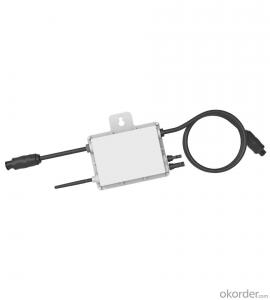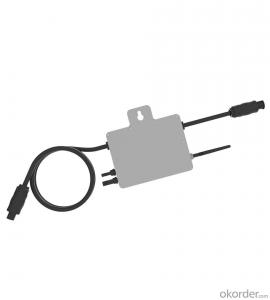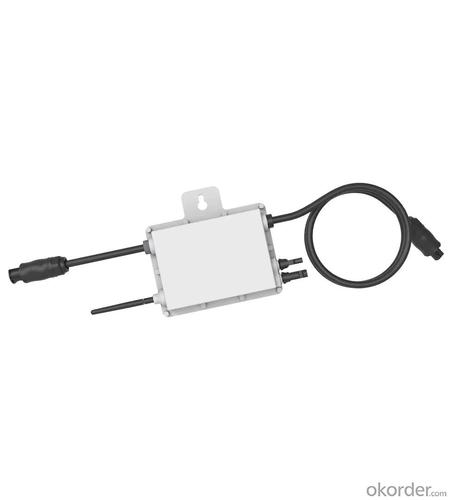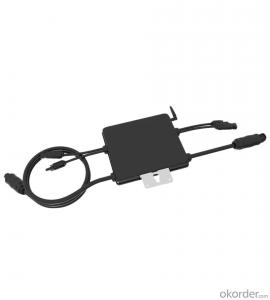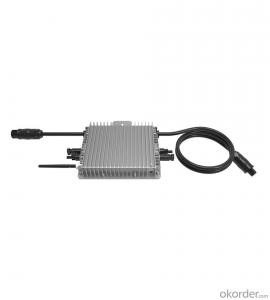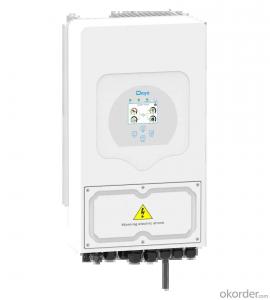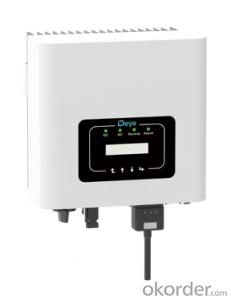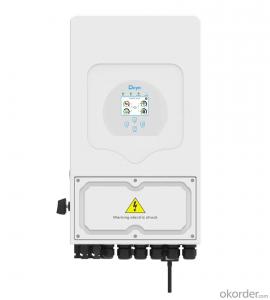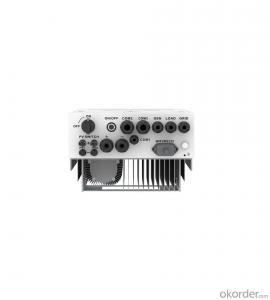All in One Solar Inverter Charger - sun300/500g3-eu-230 | 300-500w | Single Phase | 1 MPPT | Micro-Inverter | Rapid Shutdown
- Loading Port:
- Ningbo
- Payment Terms:
- TT OR LC
- Min Order Qty:
- 100 pc
- Supply Capability:
- 5000 pc/month
OKorder Service Pledge
OKorder Financial Service
You Might Also Like
Specification
| Technical Data | ||||||
| Model | SUN300G3-US-220 | SUN300G3-EU-230 | ||||
| Input Data (DC) | ||||||
| Recommended input Power (STC) | 210~400W (1 Piece) | 210~600W (1 Piece) | ||||
| Maximum input DC Voltage | 60V | |||||
| MPPT Voltage Range | 25~55V | |||||
| Full Load DC Voltage Range (V) | 24.5~55V | 40~55V | ||||
| Max. DC Short Circuit Current | 19.5A | |||||
| Max. input Current | 13A | |||||
| No.of MPP Trackers | 1 | |||||
| No.of Strings per MPP Tracker | 1 | |||||
| Output Data (AC) | ||||||
| Rated output Power | 300W | 500W | ||||
| Rated output Current | 1.4A | 1.3A | 2.3A | 2.2A | ||
| Nominal Voltage / Range (this may vary with grid standards) | 220V/0.85Un-1.1Un | 230V/0.85Un-1.1Un | 220V/0.85Un-1.1Un | 230V/0.85Un-1.1Un | ||
| Nominal Frequency / Range | 50 / 60Hz | |||||
| Extended Frequency / Range | 45~55Hz / 55~65Hz | |||||
| Power Factor | >0.99 | |||||
| Maximum units per branch | 17 | 10 | ||||
| Efficiency | ||||||
| CEC Weighted Efficiency | 95% | |||||
| Peak Inverter Efficiency | 96.5% | |||||
| Static MPPT Efficiency | 99% | |||||
| Night Time Power Consumption | 50mW | |||||
| Mechanical Data | ||||||
| Ambient Temperature Range | -40~65℃ | |||||
| Size (mm) | 189W×184H×31.5D (Without mounting bracket and cable) | |||||
| Weight (kg) | 2.15 | |||||
| Cooling | Natural cooling | |||||
| Enclosure Environmental Rating | IP67 | |||||
| Features | ||||||
| Compatibility | Compatible with 60~72 cell PV modules | |||||
| Communication | Power line / WIFI / Zigbee | |||||
| Grid Connection Standard | EN50549-1, VDE0126-1-1, VDE 4105, ABNT NBR 16149, ABNT NBR 16150, ABNT NBR 62116, RD1699, UNE 206006 IN, UNE 206007-1 IN, IEEE1547 | |||||
| Safety EMC / Standard | UL 1741, IEC62109-1/-2, IEC61000-6-1, IEC61000-6-3, IEC61000-3-2, IEC61000-3-3 | |||||
| Warranty | 10 years | |||||
Module level monitoring, safer and smarter
1 unit for 1 panel, maximize energy from each panel
Rapid shutdown function
IP67 protection degree,10 years warranty
PLC, Zigbee or WIFI communication
1 MPP trackers, module level monitoring
The SUN 300-500G3 is new generation grid-tied microinverter with single MPPT, adapting to connect 1pcs PV module. Thanks to the 1 MPP tracker design, ensuring that each PV module can harvest the highest power generation. Viewable panel performance on a PC, tablet or smart phone
- Q: Can a solar inverter be used with a backup power supply (UPS)?
- Yes, a solar inverter can be used with a backup power supply (UPS). The UPS can provide power during periods of low solar generation or in case of a grid outage, ensuring a continuous power supply.
- Q: Can I connect solar panels directly to the grid without an inverter?
- No, you cannot connect solar panels directly to the grid without an inverter. An inverter is necessary to convert the DC (direct current) output from solar panels into AC (alternating current) that is compatible with the grid.
- Q: Can a solar inverter be used in regions with high levels of lightning activity?
- Yes, a solar inverter can be used in regions with high levels of lightning activity. However, it is important to ensure that the solar inverter is properly installed and equipped with surge protection devices to mitigate the risks associated with lightning strikes. Additionally, regular maintenance and inspections should be carried out to ensure the safety and functionality of the solar inverter in such regions.
- Q: How does a solar inverter prevent reverse current flow?
- A solar inverter prevents reverse current flow by using a specialized circuitry called anti-islanding protection. This circuitry constantly monitors the grid and disconnects the solar system from it when it detects a drop in voltage or a power outage. This ensures that any excess energy generated by the solar panels does not flow back into the grid, preventing potential damage to the system and protecting utility workers during maintenance or repairs.
- Q: How does the weight of a solar inverter affect its installation process?
- The weight of a solar inverter can significantly impact its installation process. Heavier inverters may require additional support structures or mounting equipment to ensure proper installation and stability. They may also require more manpower and specialized equipment during the installation process. Conversely, lighter inverters may be easier to handle and install, potentially reducing installation time and effort. Therefore, the weight of a solar inverter is an important consideration that can influence the overall installation process.
- Q: How does a solar inverter handle low light conditions?
- A solar inverter handles low light conditions by utilizing advanced technologies such as maximum power point tracking (MPPT) and voltage boosters. These technologies enable the inverter to efficiently convert the limited amount of sunlight available during low light conditions into usable electricity. The MPPT algorithm adjusts the voltage and current to maximize the power output, while voltage boosters increase the voltage to compensate for the reduced sunlight. This ensures that the solar inverter can still generate electricity even in low light conditions.
- Q: What is the role of a grid protection relay in a solar inverter?
- The role of a grid protection relay in a solar inverter is to monitor the electrical grid for any abnormalities or faults, and to disconnect the solar inverter from the grid if necessary. This helps to ensure the safety and stability of the grid, as well as protecting the solar inverter from potential damage.
- Q: What is the role of voltage regulation in a solar inverter?
- The role of voltage regulation in a solar inverter is to ensure that the voltage output from the solar panels is converted and maintained at a stable and appropriate level for efficient and safe operation of electrical devices or for grid connection. This regulation helps to optimize the performance of the solar inverter and prevents voltage fluctuations that could potentially damage or disrupt the functioning of connected equipment.
- Q: What is the maximum AC output current that a solar inverter can provide?
- The maximum AC output current that a solar inverter can provide depends on its rating, which varies depending on the model and capacity of the inverter.
- Q: How does a solar inverter affect the overall efficiency of a solar system?
- A solar inverter plays a crucial role in the overall efficiency of a solar system. It converts the direct current (DC) generated by solar panels into alternating current (AC) that can be used to power household or commercial appliances. By ensuring optimal conversion efficiency and minimizing power losses during this process, a high-quality solar inverter can significantly impact the overall efficiency of a solar system.
Send your message to us
All in One Solar Inverter Charger - sun300/500g3-eu-230 | 300-500w | Single Phase | 1 MPPT | Micro-Inverter | Rapid Shutdown
- Loading Port:
- Ningbo
- Payment Terms:
- TT OR LC
- Min Order Qty:
- 100 pc
- Supply Capability:
- 5000 pc/month
OKorder Service Pledge
OKorder Financial Service
Similar products
Hot products
Hot Searches
Related keywords
